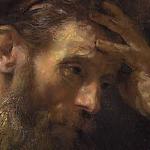Vico’s claim that verum et factum convertuntur, “the true and the made are convertible,” has been taken as a sign of the foundational atheism of modernity. Benedict XVI sees Vico’s claim as a secularization, a turn from the uncreated truth that is God to constructed human things.
As Robert Miner insists (Vico: Genealogist of Modernity), this is certainly not Vico’s own perspective. The convertibility of truth and the made is a theological claim.
Miner writes, “After linking truth and making in general, he immediately asserts that only God, strictly speaking, embodies the verum-factum principle. If the true is what is made, then ‘the first truth is therefore in God, because God is the first Maker.'” He has made all thing, and therefore understands them all perfectly: “His understanding of the elementa rerum is identical to self-knowledge” (28). Human beings think; only God possesses true understanding (intelligentia).
In another place, he contrasts divine and human knowledge by reference to two- and three-dimensional knowledge: “Divine truth is a solid image of things, like a statue; human truth is a monogram or plane image, like a painting” (quoted 28).
Vico’s position isn’t merely theistic in general, but specifically Trinitarian: “divine truth [is] the arrangement of elements that are contained within God, rather than outside of him. Both reasons of piety and demands internal to his metaphysics require Vico to distinguish between ‘created truths’ – a factum that, in some sense, exists separately from its producer – and ‘uncreated truth – a genitum that is one in being with the primus Factor. The second person of the Trinity is not a factum, but the Verbum, begotten not made” (29). This eternal wisdom “contains within itself the ideas of all things and accordingly the elements of all ideas” (quoted 29).
In short, “If Vico proceeds to associate human truth with construction, he does so only in a space that has been determined by Christian theology. Verum-factum is not a secular thesis, but a principle that requires the subordination of verum to verbum and factum to genitum” (29).











